Bird genocide: how nature took revenge on the Chinese for the extermination of sparrows
Categories: Animals | Asia | History
By Pictolic https://pictolic.com/article/bird-genocide-how-nature-took-revenge-on-the-chinese-for-the-extermination-of-sparrows.htmlOn February 12, 1958, Chinese leader Mao Zedong signed a historic decree on the extermination of all rats, flies, mosquitoes and sparrows in the country.
The idea of launching a large-scale campaign, which became part of the "Big Leap" political program, was born on February 18, 1957 at the next congress of the Communist Party of China. It was initiated, oddly enough, by biologist Zhou Jian, who was at that time the deputy Minister of Education of the country.
He was convinced that the mass destruction of sparrows and rats would lead to an unprecedented flourishing of agriculture. They say that the Chinese cannot overcome hunger in any way because they are "eaten right in the fields by voracious sparrows." Zhou Jian convinced the party members that Frederick the Great allegedly conducted a similar campaign at the time and its results were very inspiring.
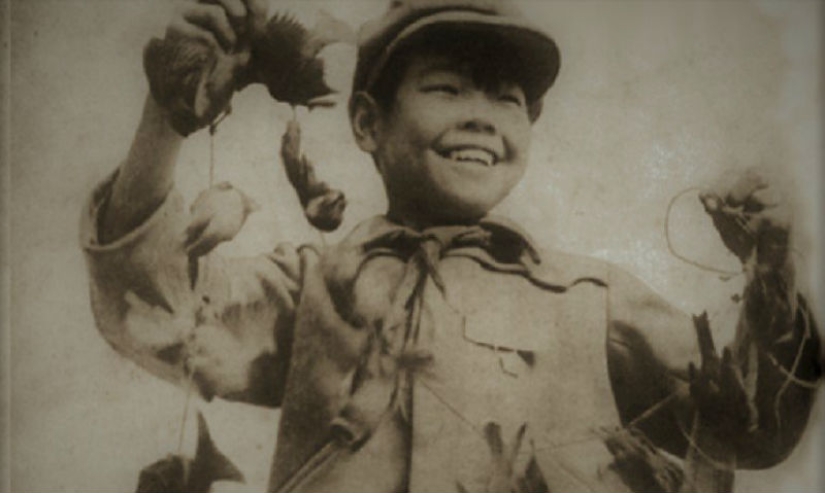
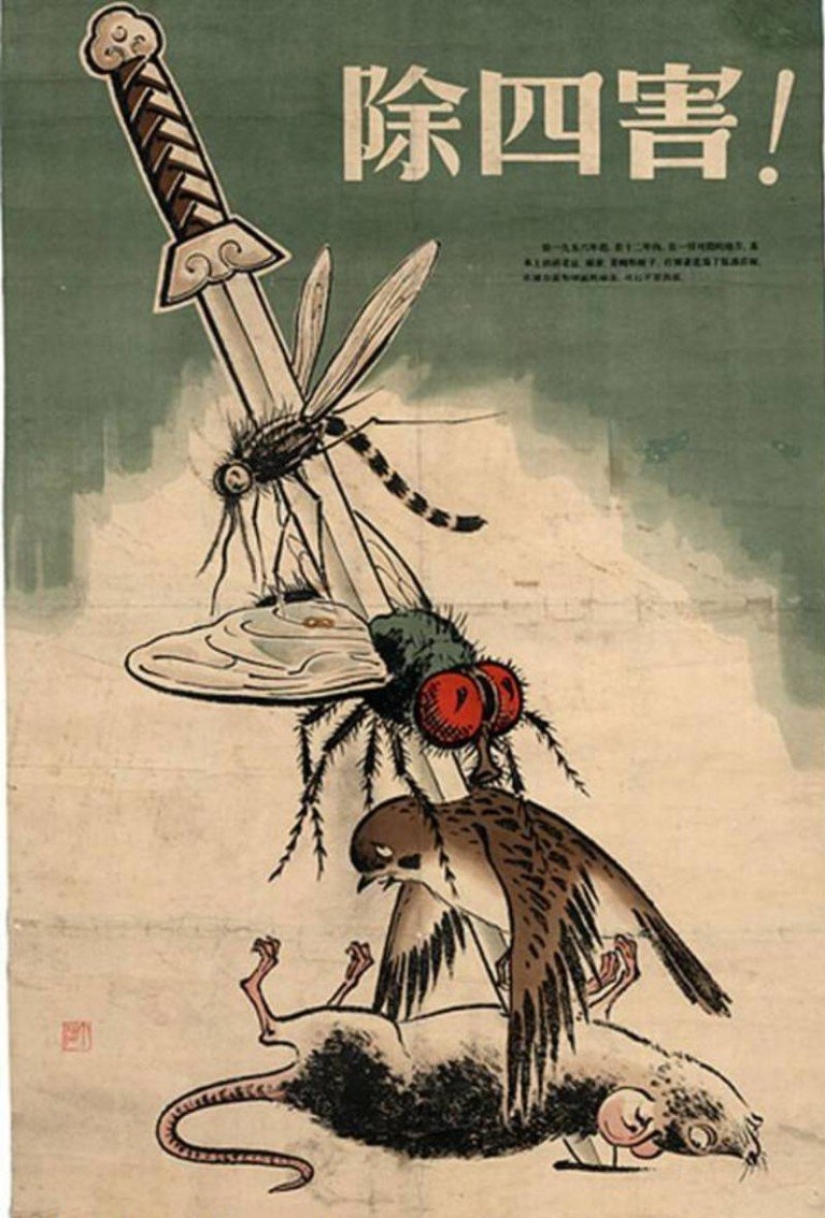
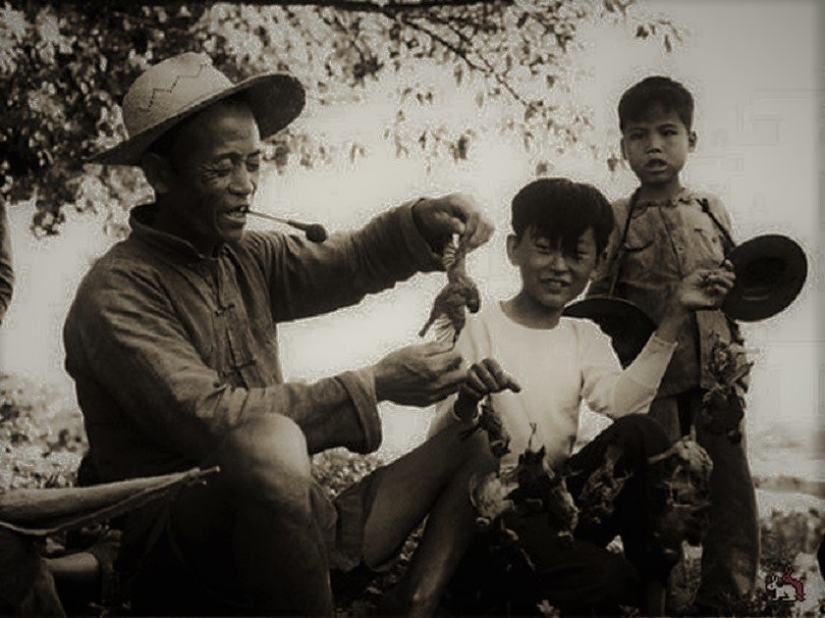 Mao Zedong did not have to be particularly persuaded. He spent his childhood in the countryside and knew firsthand about the eternal confrontation between peasants and pests.
Mao Zedong did not have to be particularly persuaded. He spent his childhood in the countryside and knew firsthand about the eternal confrontation between peasants and pests.
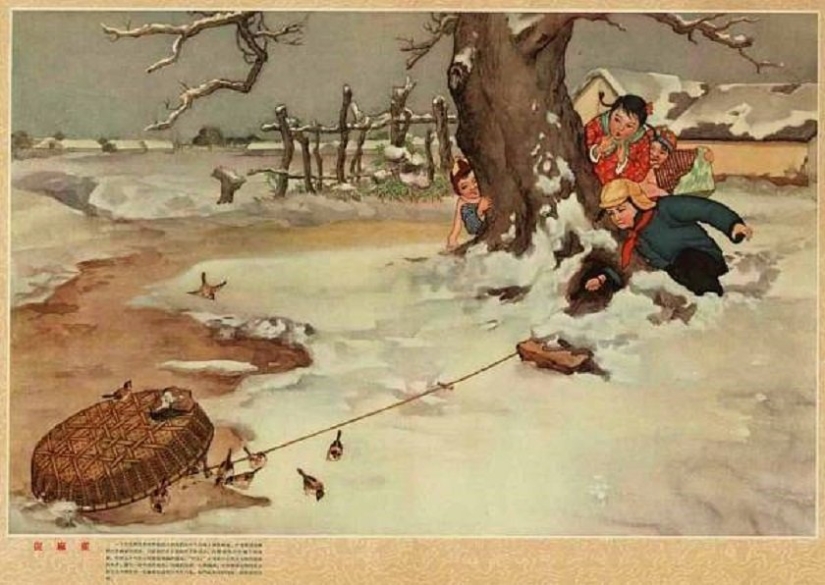 With flies, mosquitoes and rats, somehow it didn't work out right away. The rats, adapted to survive in any conditions up to the nuclear winter, did not want to be exterminated completely. Flies and mosquitoes did not seem to notice the war declared by them at all. The scapegoats were sparrows.
With flies, mosquitoes and rats, somehow it didn't work out right away. The rats, adapted to survive in any conditions up to the nuclear winter, did not want to be exterminated completely. Flies and mosquitoes did not seem to notice the war declared by them at all. The scapegoats were sparrows.
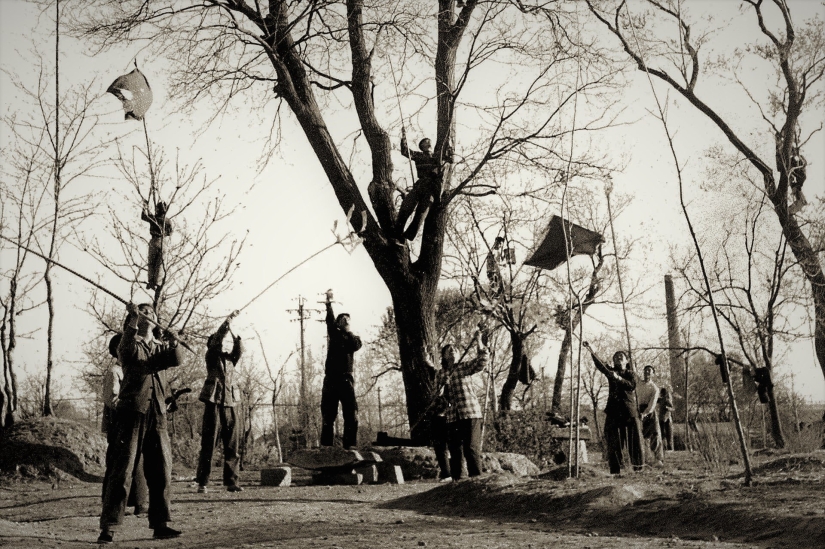 At first, they tried to poison the birds and catch them with snares. But such methods proved ineffective. Then the sparrows decided to "starve". Seeing the birds, any Chinese tried to scare them, forcing them to stay in the air as long as possible.
At first, they tried to poison the birds and catch them with snares. But such methods proved ineffective. Then the sparrows decided to "starve". Seeing the birds, any Chinese tried to scare them, forcing them to stay in the air as long as possible.
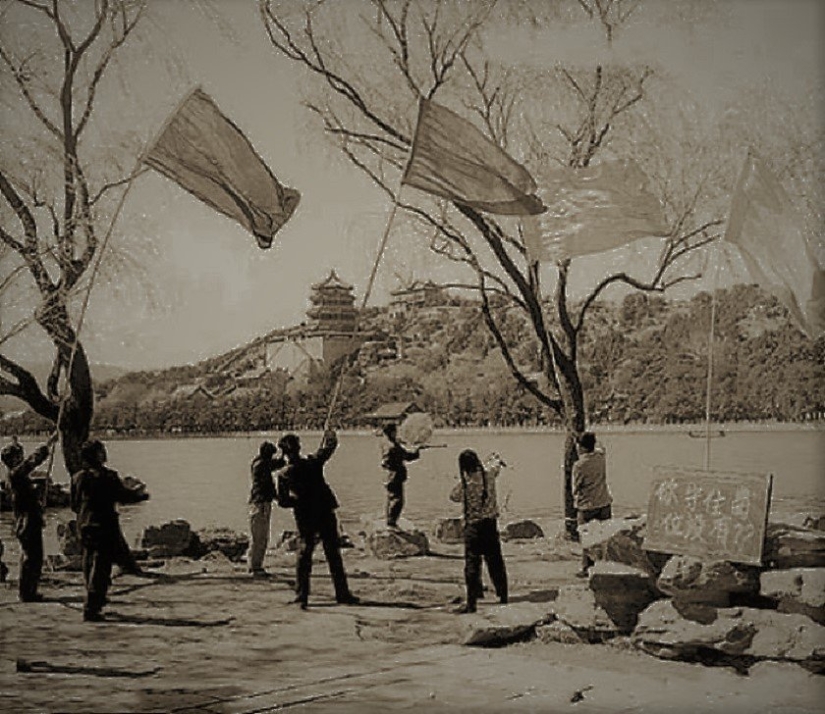 Old people, schoolchildren, children, men, women waved rags from morning to night, knocked on pots, shouted, whistled, forcing the distraught birds to flit from one Chinese to another. The method proved to be effective. Sparrows simply could not stay in the air for more than 15 minutes. Exhausted, they fell to the ground, after which they were finished off and stored in huge piles.
Old people, schoolchildren, children, men, women waved rags from morning to night, knocked on pots, shouted, whistled, forcing the distraught birds to flit from one Chinese to another. The method proved to be effective. Sparrows simply could not stay in the air for more than 15 minutes. Exhausted, they fell to the ground, after which they were finished off and stored in huge piles.
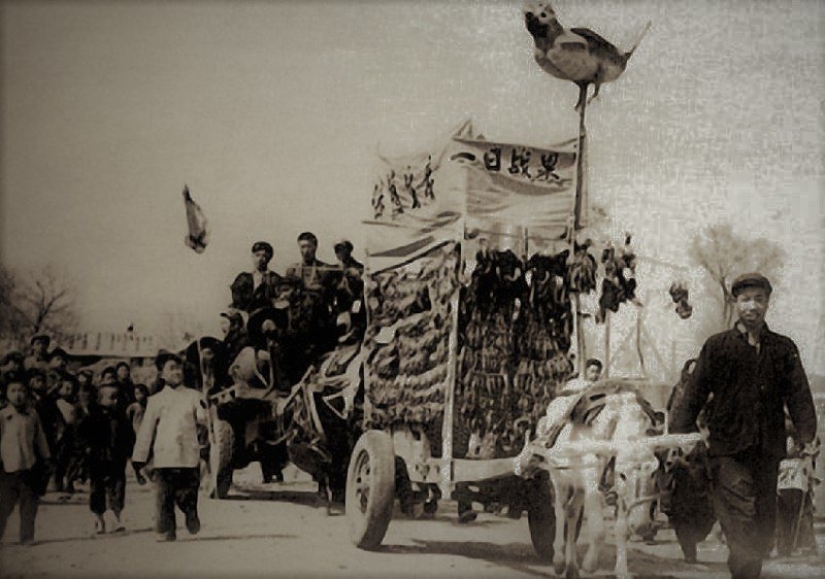 It is clear that not only sparrows were hit, but all small birds in principle. In order to inspire the already enthusiastic Chinese, photographs of many-meter mountains of bird corpses were regularly published in the press. It was a common practice to remove school students from lessons, give them slingshots and send them to shoot any small birds, ruin their nests. Especially distinguished students were given diplomas.
It is clear that not only sparrows were hit, but all small birds in principle. In order to inspire the already enthusiastic Chinese, photographs of many-meter mountains of bird corpses were regularly published in the press. It was a common practice to remove school students from lessons, give them slingshots and send them to shoot any small birds, ruin their nests. Especially distinguished students were given diplomas.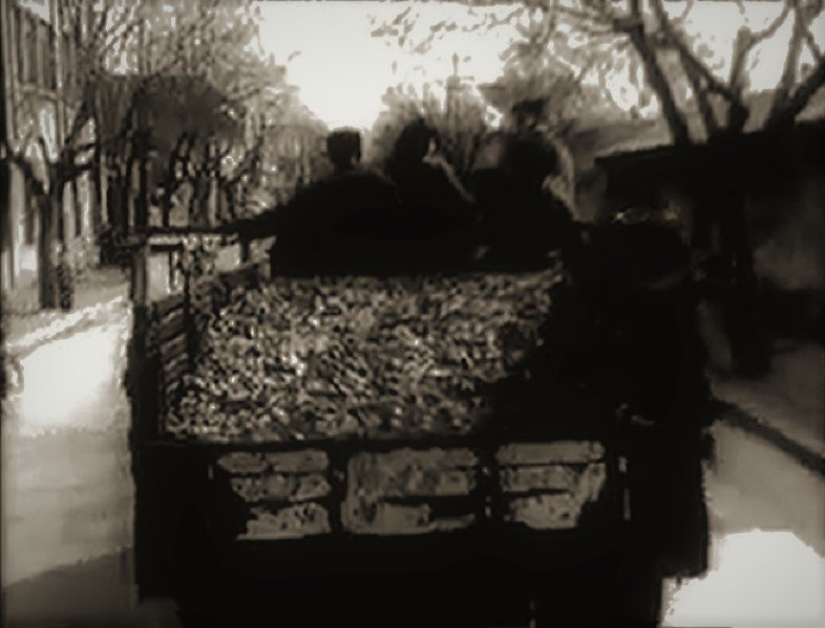 Only for the first three days of the campaign in Almost a million birds were destroyed in Beijing and Shanghai. And in almost a year of such active actions, two billion sparrows and other small birds were lost. The Chinese rejoiced, celebrated the victory. By that time, no one remembered about rats, flies and mosquitoes. They gave up on them, because it is extremely difficult to fight them.
Only for the first three days of the campaign in Almost a million birds were destroyed in Beijing and Shanghai. And in almost a year of such active actions, two billion sparrows and other small birds were lost. The Chinese rejoiced, celebrated the victory. By that time, no one remembered about rats, flies and mosquitoes. They gave up on them, because it is extremely difficult to fight them.
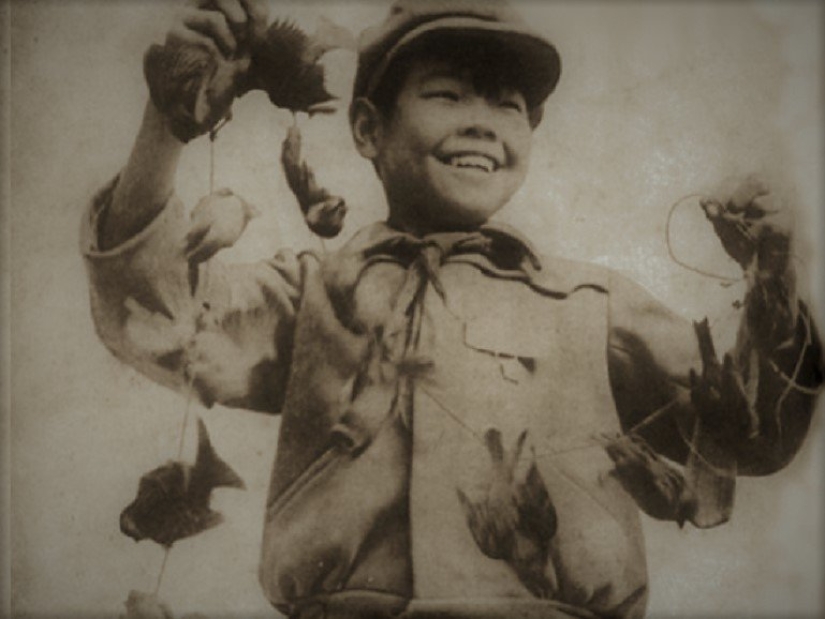 Destroying sparrows turned out to be much more fun. There were no particular opponents of this campaign either among scientists or among environmentalists. It is understandable: protest and objections, even the most timid, would be perceived as anti-party.
Destroying sparrows turned out to be much more fun. There were no particular opponents of this campaign either among scientists or among environmentalists. It is understandable: protest and objections, even the most timid, would be perceived as anti-party.
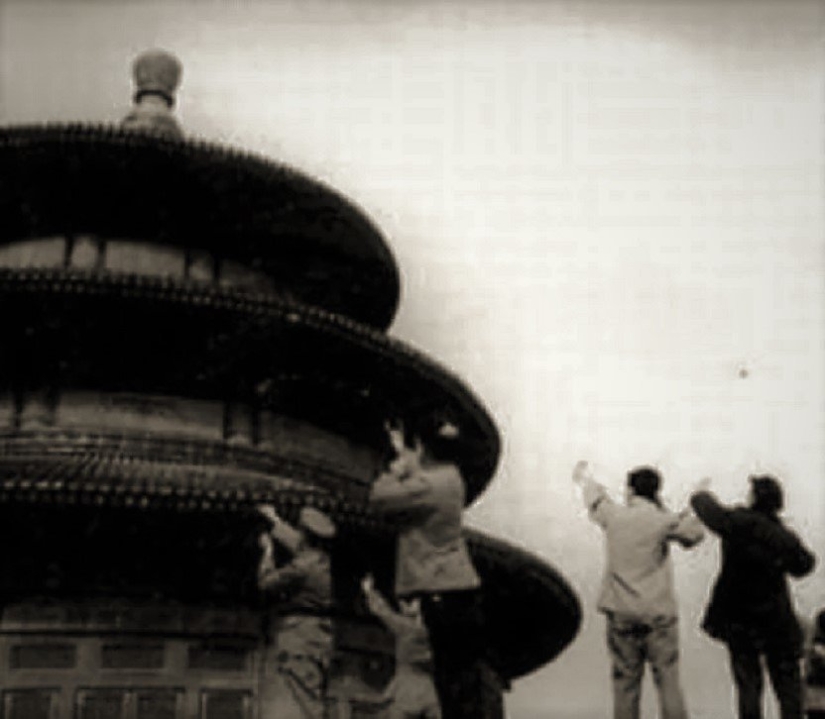 By the end of 1958, there were practically no birds left in China. Announcers from TV screens talked about it as an incredible achievement of the country. The Chinese were choking with pride. No one even doubted the correctness of the actions of the party and their own.
By the end of 1958, there were practically no birds left in China. Announcers from TV screens talked about it as an incredible achievement of the country. The Chinese were choking with pride. No one even doubted the correctness of the actions of the party and their own.
 In 1959, an unprecedented harvest was born in "wingless" China. Even skeptics, if there were any, had to admit that anti-war measures brought positive results. Of course, everyone noticed that all kinds of caterpillars, locusts, aphids and other pests had noticeably increased, but given the volume of the harvest, all this seemed to be insignificant costs.
In 1959, an unprecedented harvest was born in "wingless" China. Even skeptics, if there were any, had to admit that anti-war measures brought positive results. Of course, everyone noticed that all kinds of caterpillars, locusts, aphids and other pests had noticeably increased, but given the volume of the harvest, all this seemed to be insignificant costs.
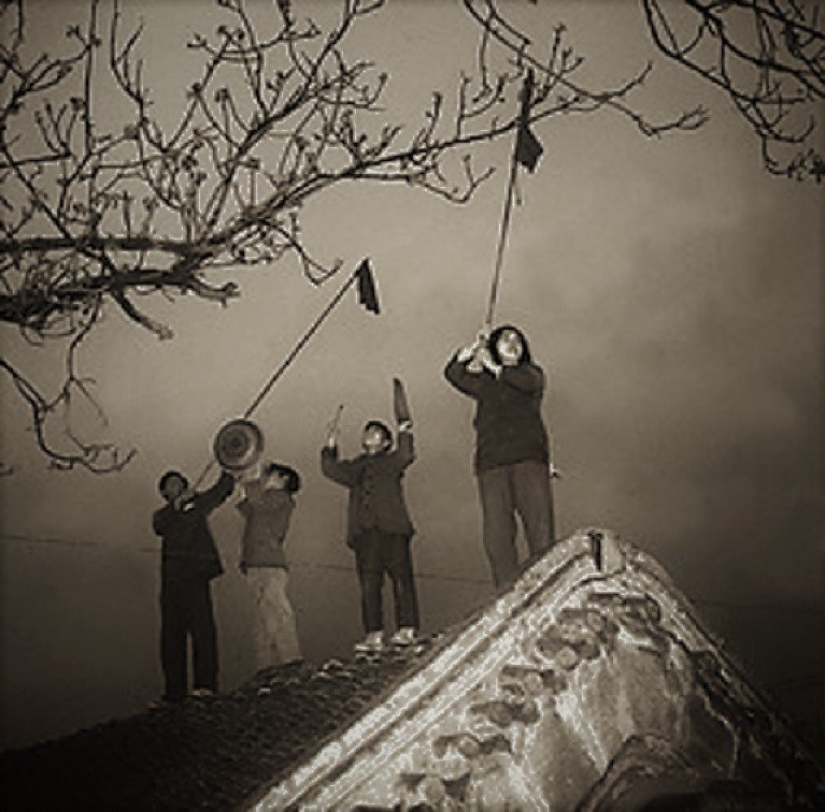 The Chinese were able to fully assess these costs a year later. In 1960, agricultural pests multiplied to such an extent that it was difficult to see and understand what kind of crop they were devouring at the moment. The Chinese were confused. Now whole schools and factories were again removed from work and study — already in order to collect caterpillars. But all these measures were absolutely useless. Not numerically regulated in any natural way (which small birds used to do just before), insects multiplied at a terrifying pace. They quickly devoured the entire crop and began to destroy the forests. Locusts and caterpillars were feasting, and famine began in the country.
The Chinese were able to fully assess these costs a year later. In 1960, agricultural pests multiplied to such an extent that it was difficult to see and understand what kind of crop they were devouring at the moment. The Chinese were confused. Now whole schools and factories were again removed from work and study — already in order to collect caterpillars. But all these measures were absolutely useless. Not numerically regulated in any natural way (which small birds used to do just before), insects multiplied at a terrifying pace. They quickly devoured the entire crop and began to destroy the forests. Locusts and caterpillars were feasting, and famine began in the country.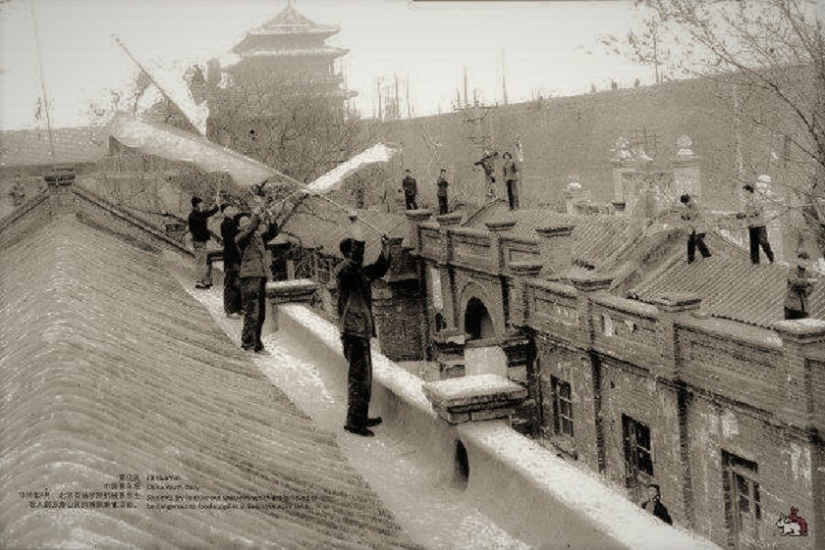 They tried to feed the Chinese from TV screens with stories that all these are temporary difficulties and everything will get better soon. But you won't be full of promises. The famine was serious — people died en masse. They ate leather things, the same locusts, and someone even ate fellow citizens. There was a panic in the country.
They tried to feed the Chinese from TV screens with stories that all these are temporary difficulties and everything will get better soon. But you won't be full of promises. The famine was serious — people died en masse. They ate leather things, the same locusts, and someone even ate fellow citizens. There was a panic in the country.
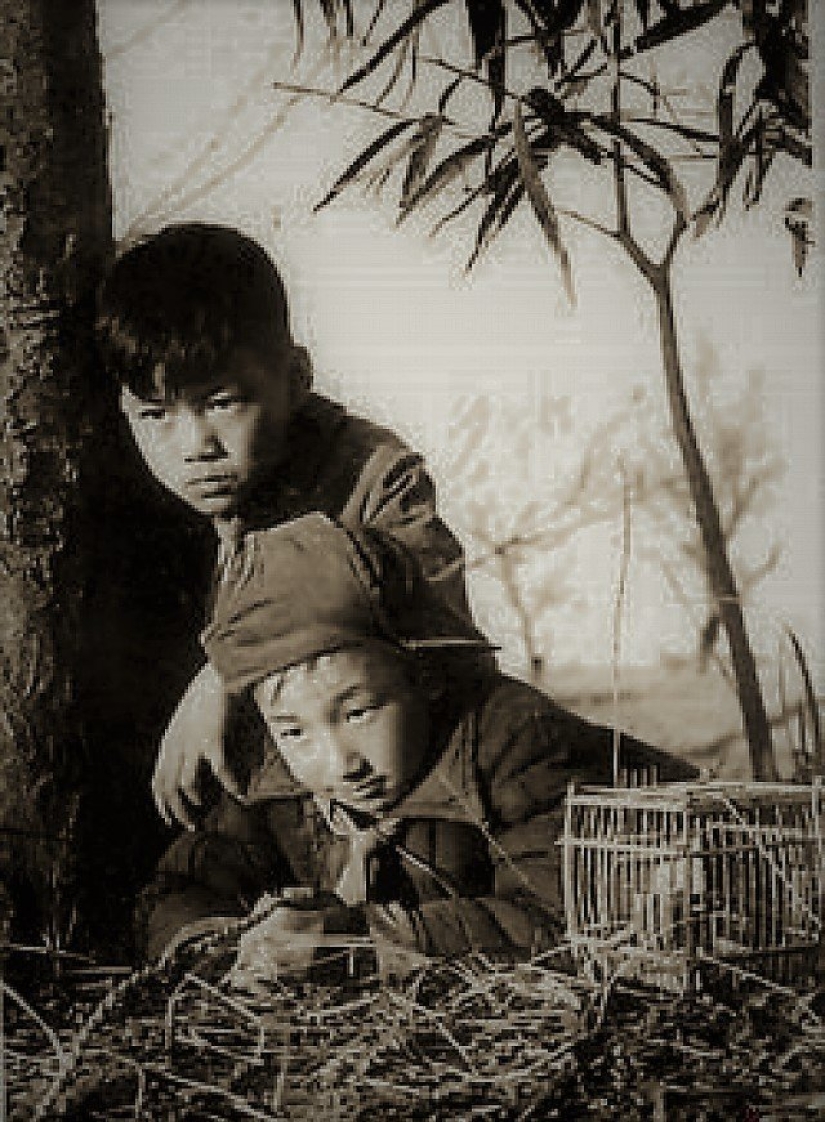 Party members also panicked. According to the most conservative estimates, about 30 million people died in China from the famine that fell on the country. Then the management finally remembered that all the troubles began with the extermination of sparrows.
Party members also panicked. According to the most conservative estimates, about 30 million people died in China from the famine that fell on the country. Then the management finally remembered that all the troubles began with the extermination of sparrows.
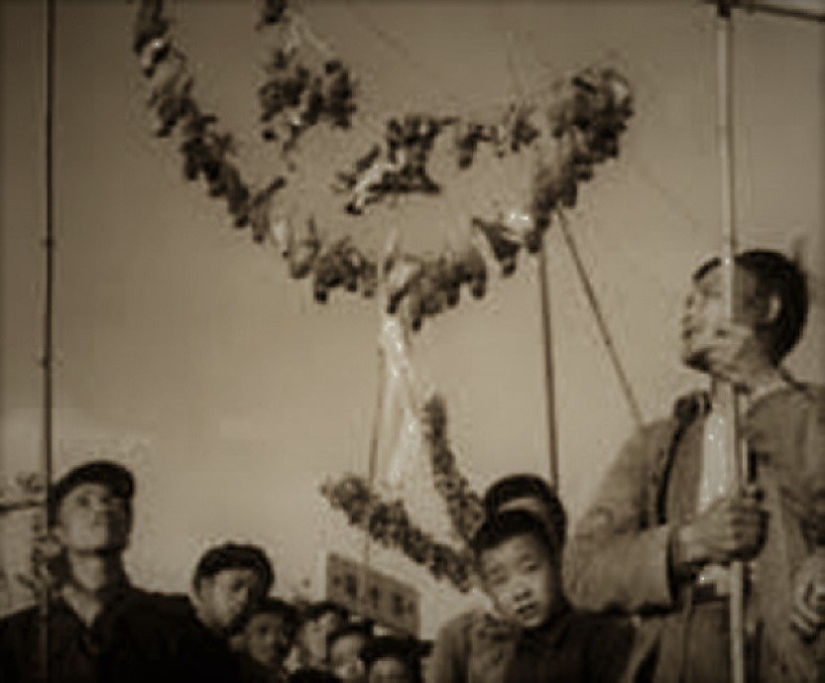 For help, China turned to To the Soviet Union and Canada — asked to send them birds urgently. The Soviet and Canadian leaders, of course, were surprised, but they responded to the call. Sparrows were delivered to China by whole wagons. Now the birds have already begun to feast — nowhere else in the world was there such a food base as the incredible insect populations that literally covered China. Since then, there has been a particularly reverent attitude towards sparrows in China.
For help, China turned to To the Soviet Union and Canada — asked to send them birds urgently. The Soviet and Canadian leaders, of course, were surprised, but they responded to the call. Sparrows were delivered to China by whole wagons. Now the birds have already begun to feast — nowhere else in the world was there such a food base as the incredible insect populations that literally covered China. Since then, there has been a particularly reverent attitude towards sparrows in China.
Keywords: Sparrows | China | Revenge | Birds
Post News ArticleRecent articles

It's high time to admit that this whole hipster idea has gone too far. The concept has become so popular that even restaurants have ...

There is a perception that people only use 10% of their brain potential. But the heroes of our review, apparently, found a way to ...
Related articles

We are accustomed to the fact that on the packaging of tea, write "loose" and rarely think about what the word means. Meanwhile, ...

Human intervention in the affairs of nature is extremely rarely successful. Especially a lot of trouble was brought to the ...

The sea is still, you are a woman or a man, if you can hold in their hands an army of 70,000. Chinese Chin si could — she started ...

New Year's is a time to surprise and delight loved ones not only with gifts but also with a unique presentation of the holiday ...